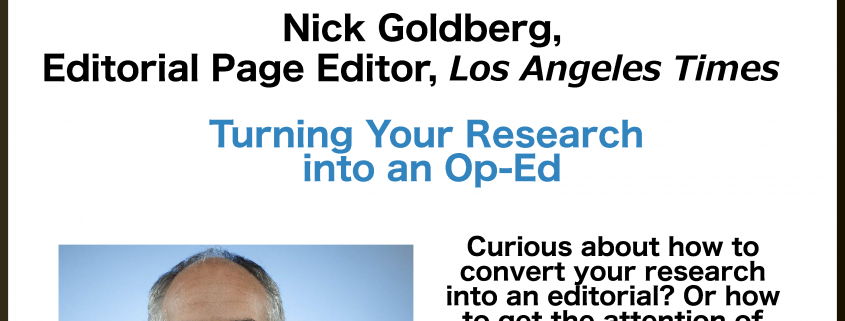
Luskin Center for History and Policy Workshop
“Putting History to Work”
“How to Turn Your Research into an Op-Ed”
Nick Goldberg, Los Angeles Times
November 26, 2018
LCHP hosted Nick Goldberg, editorial page editor for the Los Angeles Times, for the second meeting of the LCHP workshop “Putting History to Work.” This workshop session was entitled “How to Turn Your Research into an Op-Ed.” The workshop was designed to give historians and other academics practical skills for using their research to develop an op-ed and for getting their op-eds successfully accepted for publication in American news media.
Goldberg began the workshop with a list of basic rules for op-ed writing:
- Do not use jargon. Do not write an op-ed in language you would use for an academic publication.
- Begin with a story in order to promote readability for an intelligent but non-expert audience.
- Peg pieces to important political or social events and breaking news. Only in rare cases should op-eds be pegged to event anniversaries. Op-eds should provide a window into contemporary politics and events.
- Op-eds should have a clear and definable argument.
- Your argument should not be conventional wisdom. You must bring an original or distinctive point of view. Op-eds will not be accepted for publication unless they have unique viewpoints.
- Historians should bring context and broad scope to their op-ed writing and argument.
- Most op-ed submissions are time-sensitive. Get your op-ed in to the paper you select as soon as possible after news breaks.
After providing a list of ground rules, Goldberg opened the discussion for participant questions.
The first question concerned the process of applying for publication, and Goldberg described this process as follows:
- Submit the whole op-ed, not a pitch.
- Send to the relevant submission email, not to an individual contact you might know at the paper.
- Mention any contacts you have at the paper in your submission email, and follow up with these contacts in a separate email or phone call.
- Give a brief description of yourself and any qualification you have for writing the op-ed (professional position, etc.) in your submission email.
Another question concerned how best to decide what newspaper is best for a given op-ed. Goldberg noted that the best newspaper for specific op-ed submissions should be determined based on the content of the op-ed. Most newspapers have particular topics that they cover best or most frequently. The Washington Post, for example, covers national politics, while the Los Angeles Times has a special focus on California and the Pacific Rim. Determine what newspaper to submit to by deciding what newspaper best fits the topic of your op-ed.
Finally, in response to another question, Goldberg told participants to avoid open letters, petitions, and group-authored op-eds, which are rarely published by most major newspapers.


